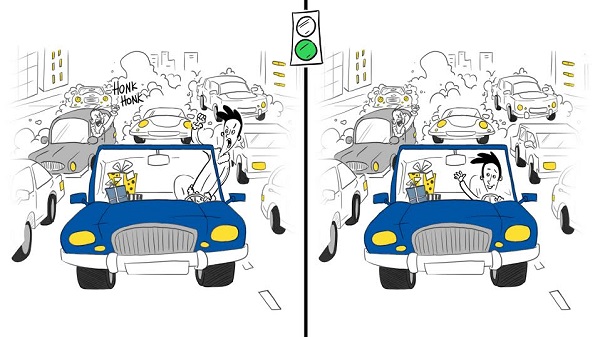
Road manners could be a motorist's ticket to a stress-free driver, a study released Monday by Goodyear and the London School of Economics and Political Science (LSE) has determined.
The study found that aggressive behaviour in one driver may trigger a similar reaction in another. This so-called Ripple Effect was found in the majority of the nearly 9,000 drivers who were surveyed from across 15 European countries, with 87% agreeeing that another's considerate driving influenced them to be a considerate driver at a later stage of their journey. 55% admitted that irritation or provocation shown by one driver on the road was able to prompt them to take their own frustration on a different driver, indicating that acts of both aggression and amiability were capable of instigating a chain of events affecting the comfort or stress levels of a driver's environment.
"Setting aside factors such as weather conditions or fatigue, the drivers around us provide an important context to which we respond as our journey unfolds," stated Dr. Chris Tennant, of the London School of Economics who led the research project. "When negotiating road space with others, drivers frequently apply the logic of reciprocity. However, since many interactions are fleeting, the reciprocity is often indirect: our response is made to a different driver later on our journey – thus, the ripple effect on the road."
Whilst previous research into road safety has focused on identifying problem drivers prone to dangerous behaviour, this latest study illustrates the harmful and beneficial consequences of one's drivers behaviour on another, whether or not they would otherwise be considered problem drivers.
"Road etiquette matters to drivers," continued Tennant. Reviewing video scenes of interactions, fewer than 10% of drivers surveyed felt that it was important to show a gesture of thanks, with the vast majority conveying the importance of such acknowledgements. Drivers freely admitted that a driver neglecting to thank them for a show of kindness would often prompt them to drive more assertively in the next interaction. This was not just restricted to saying thank you; other behaviours such as merging tactics and tailgating, poor signalling and erratic motorway lane discipline were found to be antagonisers, even when the drivers questioned admitted that they themselves performed the same behaviours.
"The road is rarely seen as a social setting, particularly one wherein good manners should be used. In fact our road safety research shows that many drivers can see other cars on the road as anonymous machines, and not as vehicles containing another human being," added Olivier Rousseau, Goodyear Vice President Consumer Tires, EMEA.“ We urge drivers to remember what strong effect their own behavior has on the behavior of others. Our study suggests that aggressive and combative driving behavior by one driver can initiate a chain of reactions between other drivers and eventually cause a dangerous situation or even an accident some time later while the originator has already moved on. It is up to all of us to stop this Ripple Effect on the road."
"There are many ways to be inconsiderate: teaching, competing, shouting, gesticulating, intimidating and all of these have the ability to escalate and intensify an inconsiderate and potentially less safe driving culture," concluded Tennant. "However, there are only a few ways to be polite bit those few ways are very powerful, such as allowing others to progress in busy traffic, making eye contact and visibly saying thank you when others let you progress, apologising when you impede others – all these oil the wheels of a considerate driving culture from which we all benefit reciprocally.”
The ongoing study has previously found that seven different personalities frequently manifest themselves on the road.
Photo by Goodyear








